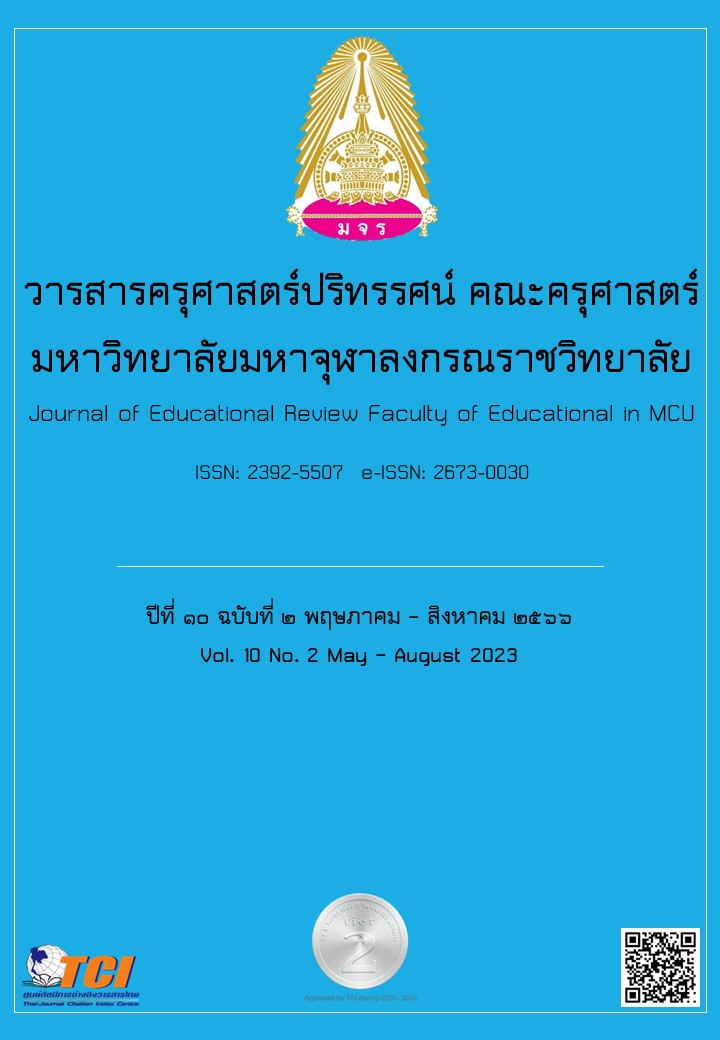A GRADE-BASED COMPARATIVE STUDY OF THAI SENIOR HIGH SCHOOL STUDENTS’ MOTIVATION FOR LEARNING THAI LANGUAGE
Main Article Content
Abstract
The purpose of the current study was twofold: (a) to examine the motivation for learning Thai language held by Thai students enrolled in Grades 9 to 12 at an international school in Thailand, and (b) to perform a statistical comparison of it, using the students’ school grade as grouping factor. A population sample of 118 students (31 students from Grade 9, 25 students from Grade 10, 28 students from Grade 11, and 34 students from Grade 12) enrolled in the target international school during the academic year 2021-2022, participated in this study. For the data collection, the Motivation for Learning Thai Language Questionnaire, adapted from Gardner’s (2010) Attitude/Motivation Test Battery (AMTB) international version, was used. From performing descriptive statistics on the collected data, it was found that the overall level of motivation for learning Thai language held by Grades 9, 10, 11 and 12 students at the target international school was slightly high. From a quantitative comparative analysis, it was found that there was a significant difference in motivation for learning Thai language between Grade 10 and Grade 11 students, with the overall motivation for learning Thai language being significantly higher for the latter group than for the former, while no significant difference in motivation for learning Thai language was found between Grade 9 and Grade 11 students, Grade 9 and Grade 12 students, Grade 10 and Grade 12 students, and Grade 11 and Grade 12 students. Based on the research findings, recommendations for Thai high school students, teachers and future researchers are provided.
Article Details

This work is licensed under a Creative Commons Attribution-NonCommercial-NoDerivatives 4.0 International License.
ทัศนะและความคิดเห็นที่ปรากฏในบทความในวารสารฉบับนี้ถือเป็นความรับผิดชอบของผู้เขียนบทความนั้นเพียงผู้เดียว และไม่ถือเป็นทัศนะและความรับผิดชอบของกองบรรณาธิการ
กองบรรณาธิการขอสงวนสิทธิ์ในการคัดเลือกบทความลงตีพิมพ์และจะแจ้งให้เจ้าของบทความทราบหลังจากผู้ประเมินบทความตรวจอ่านบทความแล้ว
ต้นฉบับที่ได้รับการตีพิมพ์ในวารสารครุศาสตร์ปริทรรศน์ คณะครุศาสตร์ มหาวิทยาลัยมหาจุฬาลงกรณราชวิทยาลัย ถือเป็นกรรมสิทธิ์ของคณะครุศาสตร์ มหาวิทยาลัยมหาจุฬาลงกรณราชวิทยาลัย ห้ามนำข้อความทั้งหมดหรือบางส่วนไปพิมพ์ซ้ำ เว้นเสียแต่ว่าจะได้รับอนุญาตจากมหาวิทยาลัยฯ เป็นลายลักษณ์อักษร
References
Bachore, M. M. (2014). Learners’ success in mother tongue-based classroom instruction and the attitudes and perceptions of school communities. International Journal of Sociology of Education. 3(2). 118-135.
Berková, K., Krejčová, K, & Novák, J. (2020). Students’ attitudes to selected subjects in secondary economic education. Problems of Education in the 21st Century. 78(1). 9-23.
Brown, H. D. (2007). Principles of language learning and teaching. Pearson Longman.
Cahapay, M. B., (2020). Attitudes toward mother tongue and academic performance: evidence from monolingual context in the Southern Philippines. International Journal of Language Teaching and Education. 4(1). 1-8.
Gardner, R. C. (1985). Sociology and second language learning: The role of attitudes and motivation. Edward Arnold.
Gardner, R. C. (2005). Integrative motivation and second language acquisition. Joint plenary talk. Canadian Association of Applied Linguistics/Canadian Linguistics Association London, Canada. From http://publish.uwo.ca/~gardner/docs/caaltalk5final.pdf Retrieved November 23, 2020.
Gardner, R. C. (2010). Motivation and second language acquisition: The socio-educational model. Peter Lang.
López Corría, I. (1999). Motivating ELT learners. English Teaching Forum. 37(2). 13-17.
Milosevic, O. (2019). The importance of mother tongue maintenance in international schools. Nastava i Vaspitanje. 68(2). 251-263.
Office of Private Education Commission [OPEC]. (2020). Thai language, Thai culture, and Thai history for international schools. Office of Private Education Commission. From https://opec.go.th/wp-content/uploads/2020/11/THAI-CULTURE-AND-HISTORY.pdf Retrieved November 23, 2020.
Ovando, C., & Collier, V. (1998). Bilingual and ESL classrooms: Teaching in multicultural contexts. McGraw-Hill.
Phindane, P. (2015). Learning in mother tongue: Language preferences in South Africa. International Journal of Educational Science. 11(1). 106-111.
Ryan, R. M., & Deci, E. L. (2000). Self-determination theory and the facilitation of intrinsic motivation, social development, and well-being. American Psychologist. 55(1). 68-78.
Skutnabb-Kangas, T. (2000). Linguistic genocide in education-or worldwide diversity and human rights. Lawrence Erlbaum.
Wen, X. (2011). Chinese language learning motivation: A comparative study of heritage and non-heritage learners. Heritage Language Journal. 8(3). 41-66.


